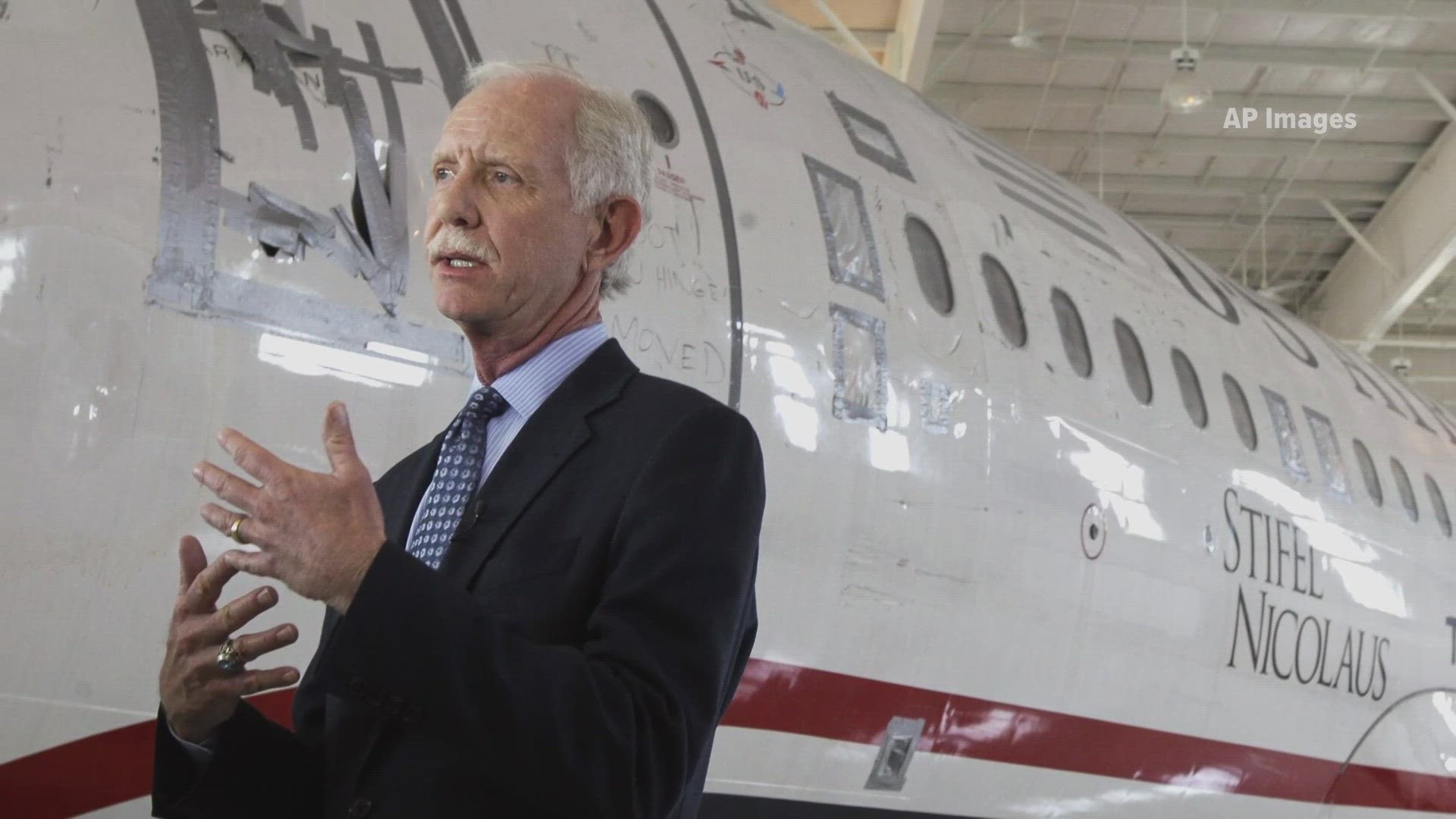PHOENIX — "Sully" Sullenberger was the pilot of what might be the most famous emergency landing in history.
All 155 people on board U.S. Airways Flight 1549 -- passengers and crew -- survived the "Miracle on the Hudson" 14 years ago.
Today the retired airline captain and diplomat is an advocate for airline safety. And U.S. Sen. Kyrsten Sinema of Arizona is on his radar.
Sullenberger made a rare appearance on Twitter to rip Sinema for a Senate amendment that would enable the Federal Aviation Administration to relax training requirements for commercial airline pilots.
Sullenberger tweeted: "I have spent a lifetime dedicated to making air travel safer, but this critical and life-saving work is about to be undone with one amendment to a bill."
In a statement to 12News, Sullenberger was more direct:
"It is experience that arms (pilots) with the critically important judgment they must have to make good decisions that keep passengers and crews safe.
"Sinema's amendment would cut and gut pilot experience levels."
Sinema's amendment would allow additional flight simulator time to count toward the 1,500-hour, in-flight training requirement for commercial airline pilots.
The airline industry views the amendment as one way, in addition to raising the mandatory retirement age, to fill the pilot shortage that's plaguing commercial airlines.
North America is about 8,000 pilots short right now, according to the consulting firm Oliver Wyman. A surge of retirements could boost the shortage to 30,000 over the next 10 years.
The amendment is opposed by unions for the nation's airline pilots and flight attendants.
"I hadn't seen any of (Sullenberger's) comments," Sinema said in an interview this week after a town hall in Phoenix.
"Sen. John Thune and I are working on an amendment that would actually enhance pilot training, and ensure that pilots who are in accredited schools can use some of the hours that they're training in simulators towards their pilot training.
"In simulation training, you experience really tough weather conditions that you probably don't ever experience in real-life training."
The House of Representatives rejected a similar amendment before it passed its version of the FAA reauthorization bill last week. The massive bill reauthorizes FAA regulations and programs for the next five years.
The House bill does raise the mandatory retirement age for airline pilots from 65 to 67, despite opposition from pilot groups.
But it's not just the airline-backed amendment that has outraged Sullenberger and other critics.
Over the last three months, Sinema has been a destination for cash from the airline industry.
According to filings with the Federal Election Commission, donations from executives and political action committees at American, Delta, Southwest, Alaska Air and Hawaiian Airlines, as well as other industry players, totaled more than $101,000 from April through June.
Sinema was dismissive when I asked her to respond to critics who claim she's putting airlines' donations ahead of passengers' safety.
"I can always count on you to ask the question that is about politics instead of about substance," she said.
"The reality is that Arizonans know that I continue working hard for all of the achievements we talked about" at the town hall, Sinema added.
Sinema, who switched her registration from Democrat to Independent last December, hasn't announced whether she'll run next year for a second term in the Senate.
Sinema's fund-raising among Democratic donors has tailed off dramatically since leaving the party.
In the first six months of this year, she's been outraised by the lone announced Democratic U.S. Senate candidate, Congressman Ruben Gallego of Phoenix.
The deadline for passing the FAA reauthorization bill is fast approaching.
Sinema's amendment last month sidetracked a Senate committee vote on the bill.
Democratic Sen. Tammy Duckworth of Illinois, an Army veteran helicopter pilot, ripped Sinema for putting "corporate profits ahead of the lives of our constituents who may want to board a commercial flight."
Starting next Monday, July 31, the Senate is scheduled to be on recess through Labor Day, Sept. 4.
The deadline to pass the FAA reauthorization is Sept. 30.
Any bill passed by the Senate would likely have to be reconciled with the companion bill already passed by the House.
The FAA bill could be overshadowed by work on an agreement on next year's budget by the same deadline, in order to prevent a federal government shutdown on October 1.
Arizona Politics
Get the latest Arizona political news on our 12News YouTube playlist here.

